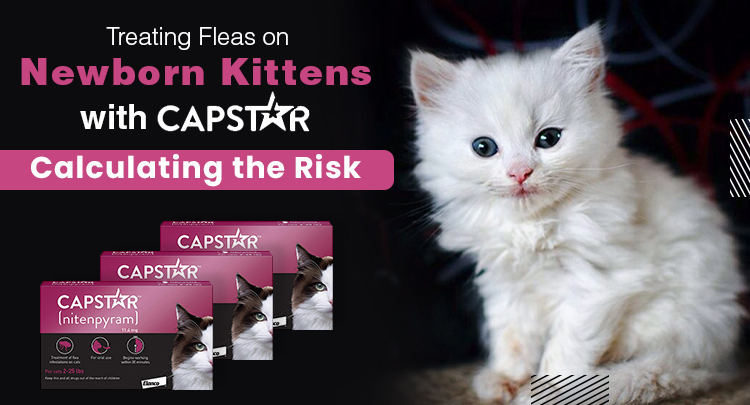Congratulations!! It is great news that your feline friend has given birth to a kitty. Now you will have an additional responsibility since the number of members in your family has increased. Remember, newborn kittens are prone to various health problems and one of them is fleas. Fleas are dangerous pests that can have harmful effects on your young one.
It needs to be noted that all the flea treatments that are currently available in the market, including: Capstar for Cats are harmful for newborns. Hence, it is recommended that you use gentle grooming techniques instead of using flea treatments to get rid of these harmful parasites from the young ones.
Note: Capstar is recommended for kittens and cats from 4 weeks of age and older.
This treatment is available in the market in the form of oral tablet which can be given to kittens that are at least 2 pounds in weight. Capstar contains nitenpyram as an active ingredient that destroys fleas on your feline friend within half an hour of administration. You can give this oral treatment to your kitty on a daily basis. But never administer this oral treatment in newborn kittens as it can lead to harmful reactions which can even be very deadly for the little ones.
Although Capstar for cats cannot be given to newborn kittens it is extremely safe to be given to pregnant and nursing moms. In order to ensure that the newborns are not exposed to fleas during birth, it is recommended to dose the pregnant mama during pregnancy and also while she is nursing. You can give 1 tablet to the maximum during a single day.
The problem with Capstar is that it only kills adult fleas; and so if you are concerned about flea eggs and larvae, then you need to use other flea preventives in combination with Capstar for best results. There are certain flea preventives available in the market that are extremely safe to be administered during pregnancy and nursing.
Note: Capstar is only effective in killing fleas that are on the cat’s coat and not in the environment.
Hence, it is important to wash their bed on a regular basis and clean the house completely to eliminate the chances of fleas and their eggs entering the house.
Now your concern would be: How do I get rid of fleas from newborn kitties when no flea preventive treatment is effective during the infant stage?
The answer is: You need to bathe the kittens with gentle dish soap. But avoid using any flea shampoo or antibacterial soap since they have been found to cause harmful effects on the health of newborn kittens. You can utilize warm water with soap on their bodies, but ensure that the soap does not enter their eyes.
Rinse the kitties in your kitchen sink. Once you are done with the bathing, wrap them up with a towel-wrapped heating pad so that they do not feel cold. Dry their body completely. Use flea comb to groom them and get rid of any fleas that are still present on their coat. Dip the comb in a cup of soapy water to kill the fleas.
Remember, the life of the newborn kittens is under threat since flea infestations are known to carry anemia, which can be very dangerous due to the small size of the newborns. If you find fleas on the newborns take the litter to the vet for a checkup and ask them relevant questions to protect your newborns from fleas. If you were not able to bathe them earlier due to uncomfortableness they will do so and discuss with you safety options that you can utilize to keep the fleas at bay.
It is advised never to divide the Capstar tablet into two halves or quarters to give to the newborns as no dose is safe to be administered on such young beings. The only option left with you is to groom them properly. Currently there are two strengths of Capstar that are available in the market:
- For cats weighing between 2 to 25 pounds and
- for dogs weighing more than 25 pounds.
You can always get capstar for cats for the mother of the litter of the kittens or for the kittens for future use.






